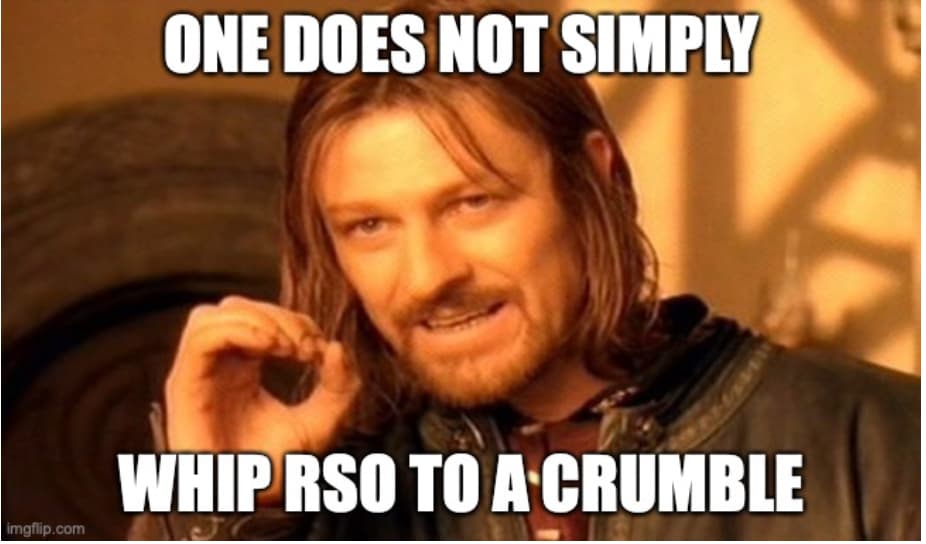If so then why not make RSO into crumble to remove the ethanol then just ingest the crumble?
Good lord…
I’m new here and don’t know much. Just trying to get info
I second what you said.
I’m gonna make a spoon friendly consumer oriented forum at some point

Is crumble “full spectrum”?
Maybe, really depends what you mean by “full spectrum” and “crumble”.
Define crumble for us…and perhap explain why your RSO still has ethanol in it
“Crumble”, around these parts is an extract consistency.
One that is fairly trivially achieved by whipping a butane extract (butane/isobutane/propane)…because of the boiling points of those solvents.
The same consistency can also be achieved (with more work) from other extracts made with other solvents such as CO2 or ethanol, or even no solvent at all.
However, taking the black goo that is traditional RSO, and whipping, even using techniques that can be used to achieve crumble from an EHO (ethanol honey/hash oil, as opposed to BHO) is never going to get you that consistency.
“Full spectrum” has become an almost meaningless marketing term. You’ll find folks here happy to sell you “full spectrum distillate”!!
A BHO crumble has more of the chemicals that were in the plant than a distillate made from the same plant, but folks making BHO aim NOT to grab the fats/waxes/chlorophyll and a bunch of other stuff that FECO (new name for RSO) manufacturers strive to include.
A CO2 crumble or and EHO crumble will have different subsets of the thousands of chemicals found in the starting biomass.
Which ones are YOU after?
The big difference you are missing is that RSO (or FECO) whether or not it is considered full spectrum is fully decarboxylated. It’s all THC and none to trace amounts of THCa. This is why it can be ingested.
Crumble on the other hand is not decatboxylated which means it has THCa and none to trace amounts of THC. Ingesting THCa will not give the desired pharmacological effect that THC does because it is not psychoactive.
You can certainly decarb your crumble in which it will no longer be considered
But instead just an oil consistency.
I am going to ingest CBGa crumble. Can CBGa crude be ingested like RSO and if so would CBGa crude have more medicinal value then CBGa crumble? I asked one slanger on here if their CBGa crude could be ingested and they said no because their CBGa crude had too high of a level of ethanol still in the crude.
Is CBGa crude and crumble decarboxylated?
I find it hard to call anything full spectrum if you’ve pulled a vac on it.
Well, at least now you’ve actually asked the question….
Vendor is wrong.
Eating ethanol is not problematic. Even if it’s 50% ethanol, you’re eating less than a gram, so your ethanol intake is minimal. Shot glass is 30ml. At 90% ethanol you would still be at less than 1/2 of a shot glass when delivering 1000mg of GBGa
With CBGa, “Crumble” is probably just purged crude, as cbga has the tendency to crystallize if you look at it sideways.
whipping as one does for BHO is not the way I would purge an ethanol crude, but with mild heat it might actually work. However, it is also completely irrelevant to getting you your meds.
Did vendor offer a COA? Posting that (with your original question) would have gotten you further faster. You should probably post it anyway.
Where you planning on diluting your CBGa before ingestion?
“Eat like RSO”?!? Does that mean with all the facial contortions associated with the nasty taste of RSO?
Yes. You can eat it. Yes it will taste nasty.
There will be little CBDa or THCa in there…which one might expect of a “full spectrum” product.
As an ethanol extract there will also be less in the way of terpenes and other volatiles. Often what one seeking “full spectrum” is after.
Not necessarily. Although quite possibly.
When decarboxylated, CBGa becomes CBG.
In the case of cbg(a), crumble could be purged crude, or it could be crystallized distillate, as both cbg and cbga crystallize.
you need to see the coa to be sure.
Carboxylated cannabinoids: CBGa, THCa, CBDa, CBCa, CBNa… any raw acidic cannabinoid with the nomenclature ending in “acid” (Cannabigerolic acid for example).
Decarboxylated cannabinoids: CBG, THC, CBD, CBC, CBN… etc (Cannabigerol).
Crude is the most basic and unrefined form of the extract meaning there are a lot of other compounds also present. Crumble is a sought after consistency which usually requires some sort of post processing. Someone correct me if I am wrong, but no, there is no difference in medicinal value between the two.
Which may or may not be part of the “full spectrum” that @Sean.R is looking for.
From my limited experience with CBG/CBGa I’m going to say CBG is a little different here. I’m also going to ask folks like @Bret_HoneyGold, @ky_cbd, and @PharmExOregon to let us know if I’m wrong (again).
There ARE folks making BHO from hemp. What THEY call a crumble would absolutely be CBGa.
However, I’ve also sampled (crystallized) CBG distillate that might legitimately be called “crumble”.
We use the term “crumble” as a colloquialism for some of our nicer crude cbga, its an oleoresin.
I thought rso decarbed? If decarbed i dont think ur gonna get it to crumble
What extraction method are you using for your crumble to look so good? Bho? Is zeropoint extraction doing the same for their 75% CBGa crumble?
I read your comment on the "What qualities make RSO “good”:
Any talk around here about taking CBGa for cancer at dosages for what someone would take RSO for cancer (say up to a gram a day)? What do you think would be the best CBGa extract for someone taking it for cancer? Bho crumble? Ethanol crude crumble?
Cryo Etoh, and little color remediation. Same thing for ZPE’s stuff.
